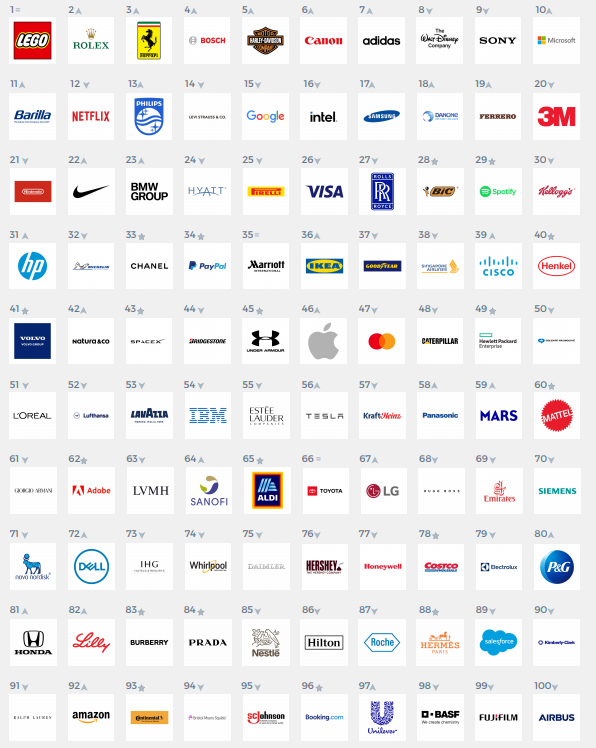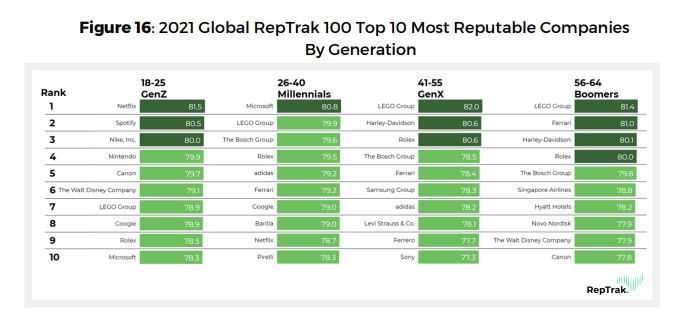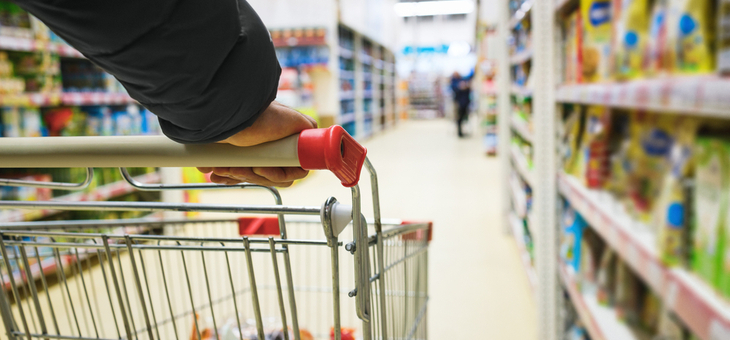Reputation is everything – in business and in life. It’s hard won, but easily lost. It can cost politicians their jobs and businesses their livelihood.
Which makes a respected global index of most reputable brands a very powerful tool.
The 2021 Global RepTrak 100 analysed more than 2000 businesses in the world’s 15 largest economies. It based its rankings on data collected in online surveys from almost 70,000 respondents between December 2020 and January 2021. To be considered, a company had to have global revenue of more than $2.6 billion and be a ‘familiar’ brand, i.e. with a “global average familiarity threshold above 20 per cent” in eight or more of the 15 countries measured. Companies were then allocated reputation scores from zero to 100.
The index authors said: “In a year when ‘super-spreader event’, ‘social distancing’ and ‘doomscrolling’ entered the popular lexicon, the outlook for corporate reputation was uncertain. With a raging global pandemic, a financial crisis, protests against systemic racism, and multiple continents on fire – all at the same time – there were many ways that companies could go wrong.
“Instead,” it said, “the top 100 emerged with stronger-than-ever reputations.”
Read more: Australia’s best supermarket
Top of the crop? Probably something most of us have played with – Lego, the toy manufacturer that was founded in Denmark in 1932.
Lego scored 80.4 out of 100 – the only company to achieve an ‘excellent’ score, with RepTrak saying that “people perceive all aspects of its business positively, particularly the company’s products and services”.
Rolex was second on 79.6, followed by Ferrari (78.8), appliance manufacturers Bosch and motorcycle makers Harley-Davidson (78.1), Canon and adidas (77.6), the Walt Disney Company (77.5), Microsoft (77.1) and Sony (77).
Just missing the top 10 were Italian pasta maker Barilla and streaming platform Netflix. The world’s second most valuable company, Apple, came in at 46, while Aldi was the highest-ranking supermarket on the list at 65, followed by Costco at 78.

The report notes key differences between the generations, with “significant disagreement” about which companies deserve to be in the top 10.
Only two companies make it into the top 10 for gen Z, millennials, gen X and boomers – the Lego Group and Rolex.
The report authors said they didn’t expect the results to veer into a sociological commentary about generations but that’s what occurred.
Read more: The seismic shift in our shopping behaviour
“In the parlance of gen Z, their top 10 ranking ‘is the most gen Z thing ever’. Netflix at No. 1 and Spotify at No. 2 speaks to a digital-first generation used to streaming content and media as a way of life.”
Netflix also made the top 10 for millennials, but is absent from the top 10 for gen X and boomers, and while Spotify is No. 2 for gen Z, it doesn’t make the top 10 for any of the other generations.
There is a similar pattern with another tech company, Google, which makes the top 10 for gen Z and millennials but not for gen X or boomers.
The report says: “The older generations have their own unique preferences, with Harley-Davidson making the top three for both gen X and boomers, but not cracking the top 10 for gen Z or millennials.

“Is it a coincidence that only the boomers, a generation that tends to prioritise healthcare, is the only generation to have a pharma company (Novo Nordisk) in the top 10? We think not.”
The report found that not every company fitted the generational divide with some companies such as the Walt Disney Company and Canon making the top 10 for gen Z and boomers but not for millennials and gen X.
What are your most trusted brands? Is it logical, or bewildering, that different generations have a different top 10?
Read more: How the online shopping boom is hurting your super
If you enjoy our content, don’t keep it to yourself. Share our free eNews with your friends and encourage them to sign up.

